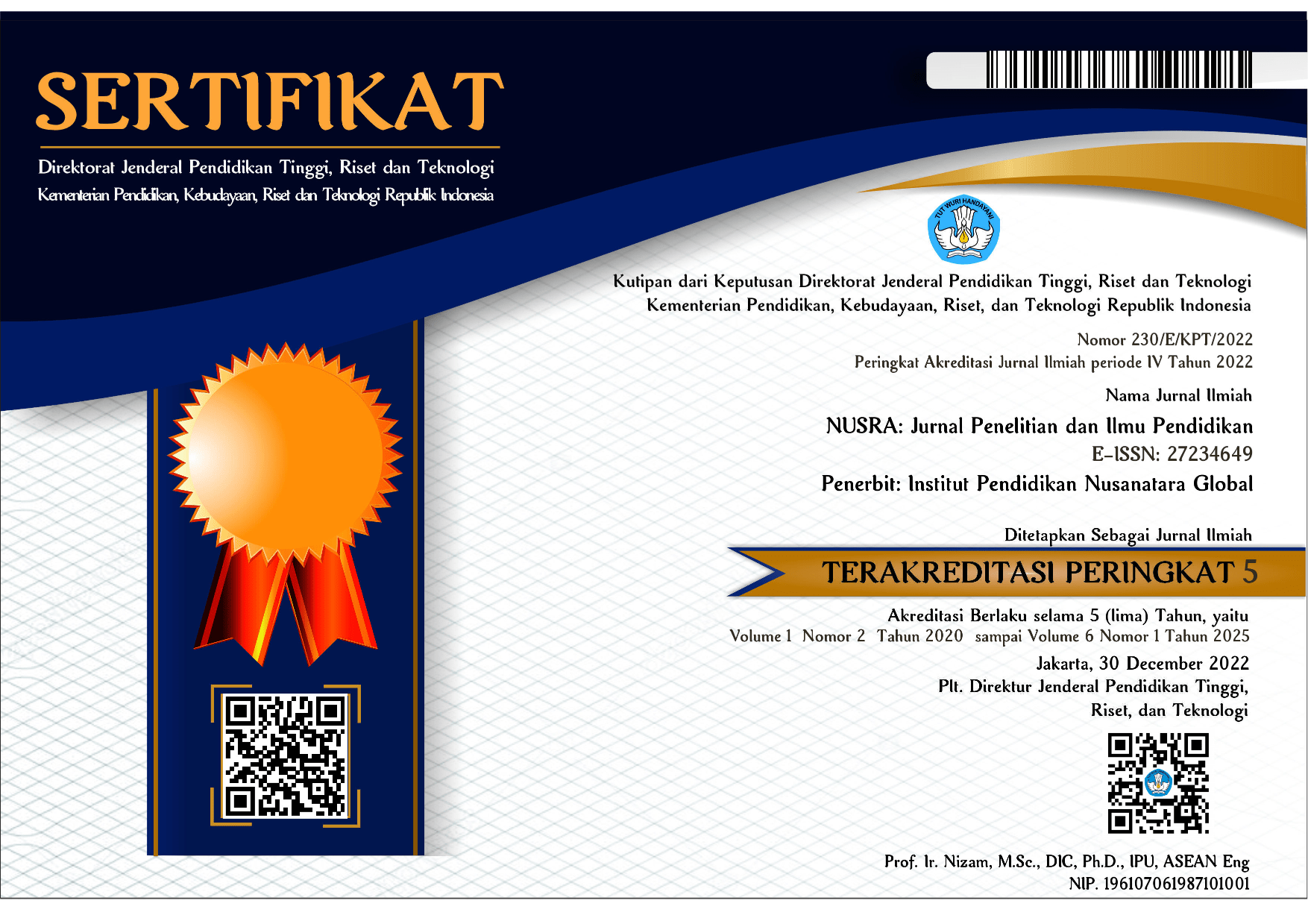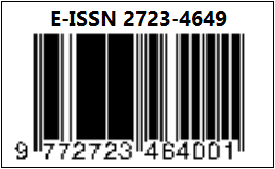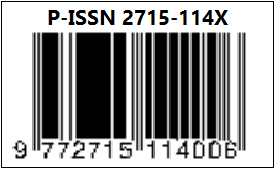Pengaruh Technological Pedagogical Content Knowledge dan Kecerdasan Emosional Terhadap Kesiapan Menjadi Guru
DOI:
https://doi.org/10.55681/nusra.v5i3.3167Keywords:
Technological Pedagogical Content Knowledge, Emotional Intelligence, Readiness to Become a TeacherAbstract
The lack of readiness to become teachers among the 2020 cohort students of the Faculty of Teacher Training and Education at Siliwangi University is the background problem of this research. This study aims to determine the influence of Technological Pedagogical Content Knowledge and Emotional Intelligence, both partially and simultaneously, on the Readiness to Become a Teacher among the 2020 cohort students of the Faculty of Teacher Training and Education at Siliwangi University. This research uses a quantitative survey method. The population in this study consists of all 1,199 students from the 2020 cohort of the Faculty of Teacher Training and Education at Siliwangi University, with a sample size of 300 students obtained through probability sampling. Data collection was carried out using questionnaires, and hypothesis testing was conducted using the t-test and F-test with the assistance of SPSS 23.0 for Windows. The research results show that: There is a significant simultaneous influence of Technological Pedagogical Content Knowledge and Emotional Intelligence on the Readiness to Become a Teacher with a significance value of 0.000 and an F-value of 162.000.
Downloads
References
Abubakar, R. (2021). Pengantar Metodologi Penelitian. Yogyakarta: SUKA-Press UIN Sunan Kalijaya.
Amsari, D., & Mudjiran. (2018). Implikasi Teori Belajar E.Thorndike (Behavioristik) dalam Pembelajaran Matematika. Jurnal Basicedu, 2(2), 52–60. https://doi.org/10.31004/basicedu.v2i2.49
Aprilita, A., & Trisnawati, N. (2022). Pengaruh Efikasi Diri, Kecerdasan Emosional dan Pengalaman Pengenalan Lapangan Persekolahan (Plp) terhadap Kesiapan Berkarir Menjadi Guru. Edukatif: Jurnal Ilmu Pendidikan, 4(4), 5494–5502. https://doi.org/10.31004/edukatif.v4i4.3267
Arifian, F. D. (2019). Peran Lembaga Pencetak Tenaga Kependidikan (LPTK) dalam Mempersiapkan Generasi Emas Bangsa. Jurnal Pendidikan Dan Kebudayaan Missio, 11(1), 26–38. https://doi.org/10.36928/jpkm.v11i1.133
Howard, S. K., Tondeur, J., Siddiq, F., & Scherer, R. (2020). Ready, set, go! Profiling teachers’ readiness for online teaching in secondary education. Technology, Pedagogy and Education, 30(1), 141–158. https://doi.org/10.1080/1475939X.2020.1839543
Kulla, T., Rumapea, P., & Tampongangoy, D. L. (2018). Kualitas Sumber Daya Manusia dalam Meningkatkan Pembangunan Desa Tinggilbet Distrilk Beoga Kabupaten Puncak Provinsi Papua. Jurnal Administrasi Publik, 4(58). https://ejournal.unsrat.ac.id/index.php/JAP/article/download/19784/19383
Mayer, J. D., Caruso, D. R., & Salovey, P. (2016). The Ability Model of Emotional Intelligence: Principles and Updates. Emotion Review, 8(4), 1–11. https://doi.org/10.1177/1754073916639667
Mitchell, L. ., & Krumboltz, J. D. (1996). A Learning Theory of Career Counseling. In W. B. Savickas, Mark L. ; Walsh (Ed.), Handbook of career counseling theory and practice (pp. 55–80). Davies-Black Publishing. https://psycnet.apa.org/record/1996-97970-005
Nabila, A., Solihat, A. N., & Gumilar. (2023). Pengaruh Technological Pedagogical Content Knowledge dan Persepsi Profesi Guru terhadap Kesiapan Menjadi Guru. Jurnal Riset Pendidikan Dan Pengajaran, 2(2), 240–258. https://doi.org/doi.org/10.55047/jrpp.v2i2.500
Perdani, B. U. M., & Andayani, E. S. (2021). Pengaruh Kemampuan Technological Pedagogical Content Knowledge (TPACK) terhadap Kesiapan Menjadi Guru. Jurnal Pendidikan Akuntansi Indonesia, 19(2), 99–115. https://doi.org/10.21831/jpai.v19i2.46021
Pool, L. D. (2020). Revisiting the CareerEDGE model of graduate employability. Journal of the National Institute for Career Education and Counselling, 44(1), 51–56. https://doi.org/10.20856/jnicec.4408
Rokhim, A., & Prakoso, A. F. (2022). Pengaruh Kecerdasan Emosional (Emotional Quotient) dan Literasi Ekonomi terhadap Kesiapan Mengajar (Teaching Readiness). Edunomic: Jurnal Ilmiah Pendidikan Ekonomi, 10(2), 131–145. https://doi.org/10.33603/ejpe.v10i2.6779
Sabaruddin, S. (2022). Pendidikan Indonesia dalam Menghadapi Era 4.0. Jurnal Pembangunan Pendidikan: Fondasi Dan Aplikasi, 10(1), 43–49. https://doi.org/10.21831/jppfa.v10i1.29347
Schmid, M., Brianza, E., & Petko, D. (2020). Developing a short assessment instrument for Technological Pedagogical Content Knowledge (TPACK.xs) and comparing the factor structure of an integrative and a transformative model. Computers and Education, 157(103967). https://doi.org/10.1016/j.compedu.2020.103967
Sugiyono. (2015). Metode Penelitian Pendidikan Pendekatan Kuantitatif, Kualitatif, dan R&D. Bandung: Alfabeta.
Utami, S. (2019). Meningkatkan Mutu Pendidikan Indonesia melalui Peningkatan Kualitas Personal, Profesional, dan Strategi Rekrutmen Guru. Prosiding Seminar Nasional Pendidikan FKIP, 2(1), 518–527. https://doi.org/10.29313/ethos.v5i2.2347
Zulhazlinda, W., Noviani, L., & Sangka, K. B. (2023). Pengaruh TPACK terhadap Kesiapan Menjadi Guru Profesional pada Mahasiswa Pendidikan Ekonomi di Jawa Tengah. Jurnal Pendidikan Ekonomi (JUPE), 11(1), 26–38. https://doi.org/10.26740/jupe.v11n1.p26-38
Downloads
Published
How to Cite
Issue
Section
License
Copyright (c) 2024 Virni Alfiqa Sopwani, Edi Fitriana Afriza, Kurniawan

This work is licensed under a Creative Commons Attribution-ShareAlike 4.0 International License.














